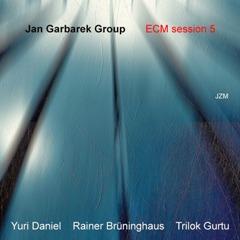Jan Garbarek Group - ECM session 5 (2013)
Jan Garbarek Group - ECM session 5 (2013)

01 Heather 02 The creek 03 Yr 04 Praise 05 Stolt oli - Tao (including bass solo) - Nrkvineliet 06 FM eleven - Quwwali - Transformations 07 Bengasi Jan Garbarek - saxes, flute Rainer Brüninghaus - piano, keyboards Yuri Daniel - bass Trilok Gurtu - drums, percussion, voice Recorded at Cinema Teatro, Chiasso – 26 november 2013
Norwegian saxophonist Jan Garbarek's icy tone and liberal use of space and long tones has long been perfect for the ECM sound and, as a result, he is on many recordings for the label. He had won a competition for amateur jazz players back in 1962, leading to his first gigs. Garbarek worked steadily in Norway throughout the remainder of the 1960s, usually as a leader but also for four years with George Russell (who was in Scandinavia for a long stretch.)
Garbarek began recording for ECM in the early '70s and, although he had opportunities to play with Chick Corea and Don Cherry, his association with Keith Jarrett's European quartet in the mid-'70s made him famous, resulting in the classic recordings My Song and Belonging.
In the 1980s, Garbarek's groups included bassist Eberhard Weber and at various times guitarists Bill Frisell and David Torn. Garbarek, whose sound is virtually unchanged since the 1970s, collaborated with the Hilliard Ensemble in 1993 (a vocal quartet singing Renaissance music) and the result was a surprisingly popular recording. Visible World followed in 1995, and four years later he resurfaced with Rites.
The spellbinding Officium album, with Garbarek’s saxophone as a free-ranging ‘fifth voice’ with the Ensemble, gave the first indications of their immense combined musical scope and emotional power. Mnemosyne (1999) expanded the repertoire beyond ‘early music’ to embrace works both ancient and modern. Now Officium Novum finds the collective at the crossroads of East and West.
A central focus is based on the adaptations of Komitas Vardapet, drawing upon both medieval sacred music and the bardic tradition of the Caucasus. The Hilliards studied these pieces during visits to Armenia, and the music’s modes encourage some of Garbarek’s most impassioned playing. Also included are Arvo Pärt’s “Most Holy Mother of God” in an a cappella reading, Byzantine chant, two pieces by Jan Garbarek, including a new version of “We are the stars”, plus Perotin’s “Alleluia, Nativitas”. ---amazon.com
download (mp3 @320 kbs):
uploaded yandex 4shared mega solidfiles zalivalka cloudmailru filecloudio oboom uplea








